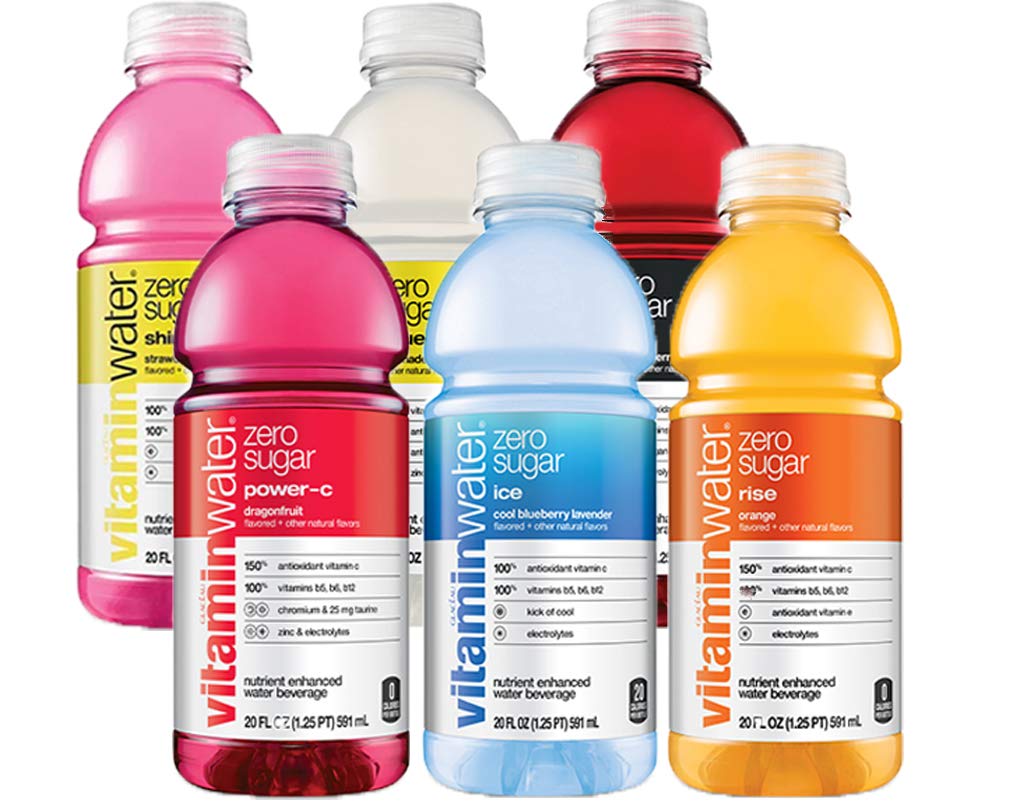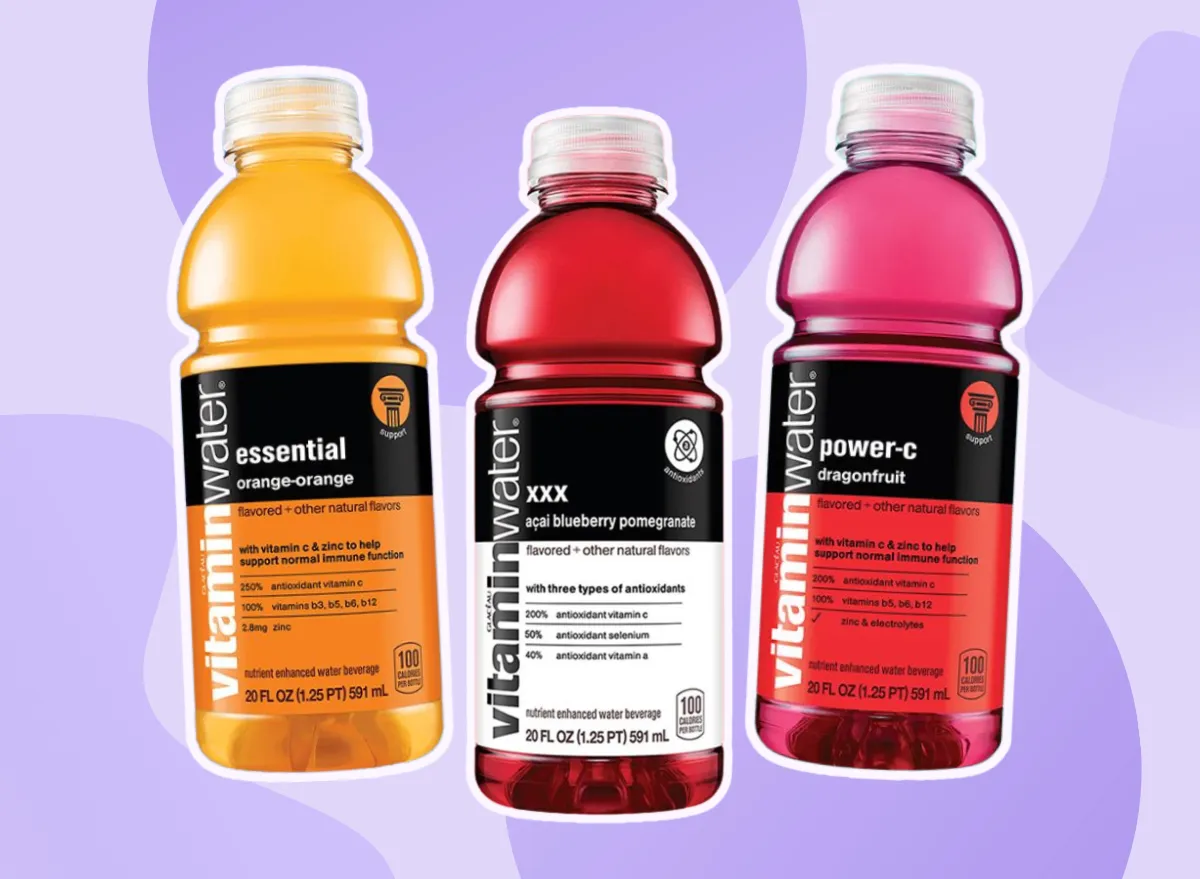Vitamin water has taken the beverage market by storm. This drink now commands a massive $7.2 billion global market and experts predict it will hit $11.9 billion by 2027. The healthy image might fool you though. A 20-ounce bottle packs 32 grams of sugar and 120 calories. This is a big deal as it means that one bottle pushes past American Heart Association’s daily sugar limit for women (25 grams) and comes close to the men’s limit (36 grams).
Sure, vitamin water gives you a tasty way to stay hydrated if plain water isn’t your thing. But the health risks might outweigh any benefits. The crystalline fructose that makes it sweet can harm you just like regular soda’s sweeteners. On top of that, most of us get enough micronutrients from our food, so those extra vitamins aren’t really needed. Some people might want to try vitamin water zero as a healthier choice. Yet questions pop up about those artificial sweeteners used instead of sugar. In this piece, we’ll get into what’s inside these drinks, what they claim to do, and what it all means for your healthy lifestyle.

Table of Contents
- 1 What is Vitamin Water and What’s Inside?
- 2 The Claimed Benefits of Vitamin Water
- 3 The Hidden Downsides You Should Know
- 4 Do You Really Need the Extra Vitamins?
- 5 Marketing vs. Reality: Is Vitamin Water Actually Good for You?
- 6 Summing it all up
- 7 Here are some FAQs about if is vitamin water good for you:
- 7.1 Are vitamin waters actually healthy?
- 7.2 Can I drink 1 vitamin water a day?
- 7.3 Is vitamin water healthier than Gatorade?
- 7.4 Is it okay to replace water with vitamin water?
- 7.5 What is the vitamin water scandal?
- 7.6 What is the healthiest drink besides water?
- 7.7 Is vitamin water better than soda?
- 7.8 Is bai good for you?
- 7.9 How much caffeine is in vitamin water?
What is Vitamin Water and What’s Inside?
Vitamin Water markets itself as a refreshing drink that combines hydration with nutrients. Since its launch in the early 2000s, this colorful beverage caught people’s attention by promising more benefits than plain water.
Common ingredients and flavors
The simple formula behind Vitamin Water mixes filtered water, crystalline fructose or stevia (in zero-sugar versions), vitamins, and natural flavors. You’ll find vitamins B3, B5, B6, B12, and C in most varieties, though exact amounts differ by flavor. Many versions also come with electrolytes, mainly potassium and sodium.
The flavor lineup gives you plenty of choices:
- XXX (Triple Berry) – Blends acai, blueberry, and pomegranate
- Power-C (Dragonfruit) – Features dragonfruit flavor with vitamin C
- Energy (Tropical Citrus) – Contains B vitamins and guarana
- Focus (Kiwi-Strawberry) – Has vitamins A and E
- Revive (Fruit Punch) – Contains B vitamins and potassium
- Essential (Orange-Orange) – Features calcium and vitamin C
Each variety targets different wellness areas through unique vitamin combinations. Nutritionists question whether these added vitamins make any real difference, especially since most people get enough vitamins from their daily meals.
The “Zero” line uses stevia instead of crystalline fructose to eliminate sugar content that critics often point out as concerning. All the same, some consumers worry about the artificial sweeteners in Zero versions.
Who owns Vitamin Water?
Vitamin Water started as an independent product by Glacéau (Energy Brands), but Coca-Cola bought the brand in 2007 for $4.1 billion. This purchase was one of Coca-Cola’s moves into healthier beverages as people moved away from regular sodas.
Coca-Cola made Vitamin Water accessible to more people by expanding to over 35 countries. The company managed to keep the brand’s identity while tweaking formulas, mostly by cutting down sugar to address health concerns.
Does Vitamin Water have electrolytes?
Vitamin Water contains electrolytes – potassium and sodium. These elements help your body stay hydrated and function properly. Potassium helps balance fluids and control muscle contractions, while sodium helps with nerve function and fluid balance.
Different flavors have varying amounts of electrolytes, usually between 50-120mg of potassium and 0-100mg of sodium per bottle. That’s more than plain water but nowhere near what you get in sports drinks like Gatorade or Powerade, which pack 3-5 times more electrolytes.
Vitamin Water’s electrolytes might help a bit during light exercise. Athletes or people who sweat a lot need more electrolytes than what this drink provides.
The brand positions itself between water and sports drinks, offering some benefits with better taste than plain water. The big question remains: is vitamin water good for you? The answer depends on what you’re comparing it to and what your body needs.
The Claimed Benefits of Vitamin Water
Vitamin Water’s marketing promises a world of benefits beyond just hydration. The colorful bottles and catchy names tell a story of health and wellness—but does this story hold up?
Hydration with added flavor
People don’t drink enough plain water throughout the day. Vitamin Water presents itself as the answer to this problem by offering hydration with flavors that make you want to drink more.
The bright colors and fruit flavors create an experience plain water can’t match. These improved beverages might help you drink more if you find water boring. The added electrolytes in some varieties supposedly help you stay hydrated better than plain water, especially after exercise.
Some nutritionists agree that flavored drinks might make people drink more fluids, especially in hot weather or when sick. The company promotes specific varieties like “Refresh” that claim to provide “sports-drink level of rehydration”, suggesting they work better than water.
Experts warn that regular Vitamin Water’s high sugar content can work against hydration benefits. Note that while it might help with mild dehydration, plain water works better for everyday hydration.
Convenient source of vitamins
Vitamin Water’s main selling point is its vitamin content—marketed as a quick and easy way to boost nutrients while staying hydrated. Different flavors pack various vitamin combinations that focus on:
- B vitamins (B3, B5, B6, B12) for energy metabolism and nerve function
- Vitamin C for immune support (up to 200% of daily value in some varieties)
- Zinc (25% daily value in some flavors)
- Electrolytes for hydration support
Marketing messages push these nutrients with claims like “vitamins + water = all you need”, hinting these drinks provide everything you need for good health.
Busy consumers love the convenience factor. Drinking Vitamin Water seems easier than taking supplements or planning nutrient-rich meals.
Nutritional experts don’t buy these claims. Most Americans get enough vitamins through their regular diet. Water-soluble vitamins (like B and C) aren’t stored in your body—extra amounts just pass through without adding benefits.
Is acai-blueberry-pomegranate Vitamin Water good for you?
Vitamin Water’s XXX flavor (acai-blueberry-pomegranate) stands out as a fan favorite. This purple drink claims to “help fight free radicals with three types of antioxidants: vitamin-a, vitamin-c and selenium” plus B vitamins.
The name itself—featuring three popular superfoods—creates strong health connections. Acai, blueberry, and pomegranate pack real antioxidant benefits, making this variety seem like a healthy choice.
The reality disappoints. Each bottle packs about 32 grams of sugar—that’s 8 teaspoons—mostly from crystalline fructose. The actual fruit content stays minimal, with most flavor coming from “natural flavors” instead of real fruit extracts.
A lawsuit against Coca-Cola showed how this variety, among other Vitamin Water products, misled consumers with claims like “vitamins + water = all you need” while hiding significant sugar content. The settlement forced Coca-Cola to make honest labels that clearly show “sweeteners” and “120 calories”.
To wrap up, Vitamin Water gives you flavor and some vitamins, but you need to consider its sugar content and questionable marketing claims before making it your go-to drink.

The Hidden Downsides You Should Know
The truth about Vitamin Water goes beyond its bright bottles and vitamin-enriched marketing claims. Let’s look at what makes this popular drink less healthy than you might think.
High sugar content and calories
A single 20-ounce bottle of regular Vitamin Water packs about 32 grams of sugar – that’s 8 teaspoons. The American Heart Association suggests men should limit their daily added sugar to 36 grams and women to 25 grams. This means one bottle can give you 50-100% of your daily sugar limit.
Each bottle contains 120-125 calories, which is close to a can of Coca-Cola’s 140 calories. The calories mostly come from crystalline fructose or sugar, and they don’t offer much nutrition besides the added vitamins.
Your health could face these risks from too much added sugar:
- Type 2 diabetes and insulin resistance
- Heart disease and increased blood cholesterol
- Metabolic syndrome and fat buildup around organs
- Tooth decay and potential weight gain
The nutrition label can trick you because it shows a serving size of 240ml, but the bottle actually holds 591ml. Many people drink the whole bottle without knowing they’re getting more than twice the listed sugar.
Artificial sweeteners in zero versions
Vitamin Water Zero offers a different option. This sugar-free version uses stevia as a sweetener instead of sugar. While stevia helps avoid sugar’s effects, some people don’t like its taste.
The product claims to have “no artificial sweeteners, flavors or synthetic colors”. Scientists still question the long-term effects of drinking lots of stevia, with some research showing possible issues with reproductive health and blood pressure.
Is Vitamin Water bad for you?
The answer depends on your needs and situation. Someone switching from regular soda might find Vitamin Water a better choice. But health experts link its sugar content to rising obesity and chronic disease rates.
Remember that the added vitamins don’t make up for the high sugar content. Dr. Walter Willett from Harvard T.H. Chan School of Public Health points out that “Most of the commercial vitamin waters contain sugar or other sweeteners that can be harmful”.
A regular multivitamin costs less than 10 cents per day. This makes Vitamin Water an expensive and possibly harmful way to get your daily vitamins.
Do You Really Need the Extra Vitamins?
Vitamin-fortified waters are popular, but a crucial question remains: does your body need these extra nutrients?
Are vitamin waters good for you if you eat well?
You likely won’t benefit much from vitamin water if you maintain a balanced diet. Nutritionists stress that whole foods can fulfill most people’s nutritional needs without fortified beverages. Research consistently shows that a well-rounded diet rich in fruits, vegetables, and protein provides all necessary vitamins.
“You can’t supplement your way out of a bad diet,” experts warn while recommending nutritious foods as the priority. The European Food Safety Authority also emphasizes that supplements shouldn’t replace a balanced diet. Vitamin water ends up being an expensive vitamin source, especially when a standard multivitamin costs less than 10 cents daily.
Water-soluble vs. fat-soluble vitamins
Your body’s vitamin processing mechanism explains why vitamin water might not deliver its marketed benefits:
Water-soluble vitamins (B vitamins and vitamin C) dissolve in water without long-term storage. Your body flushes excess amounts through urine. This explains why manufacturers add these vitamins to water—they’re safer in higher doses since your body eliminates unused portions.
Fat-soluble vitamins (A, D, E, and K) work differently. Your body absorbs them with dietary fat and stores them in fat tissue and liver for up to 6 months. This long storage means they can build up to harmful levels with excessive intake.
A study that compared vitamin absorption from vitamin water and food found no major difference in how well the body absorbed vitamins B6, B12, and C from either source.
Risks of over-supplementation
Too many vitamins can harm your health. Excess water-soluble vitamins usually cause mild problems like nausea, diarrhea, and stomach cramps. Fat-soluble vitamin overload poses bigger risks since these vitamins accumulate in your tissues.
Today’s fortified food scene makes this problem worse. Enriched cereals, energy bars, fortified pasta, and supplements lead many people to exceed recommended nutrient levels unknowingly. Vitamin water adds to this concern since many varieties pack up to 50% of your daily recommended vitamin intake.
The National Kidney Foundation cautions that your urinary tract must filter excess vitamins, which could affect kidney function. This shows why moderation matters, even with products that seem beneficial.
Marketing vs. Reality: Is Vitamin Water Actually Good for You?
The marketing wizards behind Vitamin Water paint a picture of health and wellness that doesn’t line up with reality. Let’s look at the difference between their promises and what you actually get.
The health halo effect
Vitamin Water shows us exactly what the “health halo effect” looks like. People see one healthy ingredient and think the whole product must be good for them. Adding vitamins makes the drink seem healthy enough to distract from less healthy ingredients like sugar. You’ll notice phrases like “nutrient enhanced” plastered on bottles that convince customers to pay extra for what’s basically sugar water with some vitamins thrown in.
This smart positioning lets Vitamin Water charge more than plain water. The global market reached $7.20 billion in 2021 and should climb to $11.90 billion by 2027.
Legal controversies and misleading claims
Vitamin Water’s marketing tactics landed them in hot water legally. Coca-Cola (who bought Vitamin Water in 2007) faced a lawsuit in 2009 over false and misleading ads. The company made claims like “vitamins + water = what’s in your hand” and “vitamins + water = all you need”.
The 2016 settlement forced Coca-Cola to:
- Stop claiming Vitamin Water only contains vitamins and water
- Quit suggesting the drink meets all health needs
- Show calorie content clearly on packaging
- Clearly state the product contains “sweeteners” and “120 calories”
The UK’s Advertising Standards Authority didn’t sit idle either. They banned Coca-Cola from calling Vitamin Water “nutritious” because it contained too much sugar.
Is Vitamin Water Zero good for you?
Vitamin Water Zero tackles the sugar problem by using stevia and erythritol. The company markets it as having “no artificial sweeteners, flavors or synthetic colors”. Questions still linger about drinking too much of these plant-based sweeteners.
Zero varieties barely have any calories and might work better for people who want hydration plus vitamins. But nutrition experts warn that these “healthier” options could upset your stomach if you drink too much.
A health expert sums it up nicely: “Most of the commercial vitamin waters contain sugar or other sweeteners that can be harmful”.
Summing it all up
The truth about Vitamin Water becomes obvious when you look past its colorful bottles and health promises. This beverage doesn’t live up to its healthy image. Each bottle packs 32 grams of sugar that wipes out any good you might get from those added vitamins and minerals.
Plain water works best for anyone who wants to stay hydrated. Our bodies run on simple H2O with no need for sweeteners or extra vitamins. People who want to boost their vitamin intake should get nutrients from whole foods or take a basic multivitamin that costs nowhere near what these flavored drinks do.
Vitamin Water Zero gets rid of the sugar issue but brings up new questions about artificial sweeteners. It keeps pushing this wrong idea that we need fancy drinks to be healthy. The company’s legal troubles over its marketing claims show why we need to inspect these “health” products carefully.
You have better options if you want water with flavor. Making your own fruit-infused water is a great way to get taste without added sugars or artificial ingredients. Just add some cucumber slices, berries, citrus, or herbs to your water. Hot and iced herbal teas are another excellent choice.
The real story of Vitamin Water shows how marketing promises often don’t match nutritional facts. It’s a perfect example of how smart branding can turn sugary water with a few vitamins into something people call a health drink. Smart consumers should look beyond the bright packaging and think about what their bodies really need for healthy hydration.
Here are some FAQs about if is vitamin water good for you:
Are vitamin waters actually healthy?
While marketed as healthy, the question of is vitamin water good for you has mixed answers due to added sugars in regular versions. The is vitamin water actually good for you debate centers around whether the vitamin content outweighs the sugar content (about 30g per bottle). Zero-sugar versions like is vitamin water zero good for you may be better options, but they still contain artificial sweeteners that some health experts question.
Can I drink 1 vitamin water a day?
Drinking one vitamin water daily is generally safe, especially if choosing is zero vitamin water good for you options without sugar. However, the is vitamin water good for you consideration depends on your overall diet – they shouldn’t replace whole food vitamin sources. For flavored hydration, is acai-blueberry-pomegranate vitamin water good for you might be an occasional better choice than soda, but plain water is ideal.
Is vitamin water healthier than Gatorade?
When comparing is vitamin water good for you versus Gatorade, vitamin water typically has fewer electrolytes but more vitamins. The is vitamin water zero good for you version may be preferable for casual drinkers needing hydration without intense workout recovery. However, for athletes, Gatorade’s electrolyte profile might be more beneficial despite the is vitamin water actually good for you marketing claims.
Is it okay to replace water with vitamin water?
Nutritionists agree you shouldn’t fully replace water with vitamin water, even if considering is zero vitamin water good for you options. While is vitamin water good for you as an occasional alternative, plain water remains the gold standard for hydration without additives. The is acai-blueberry-pomegranate vitamin water good for you question highlights how flavored varieties still can’t match water’s pure hydration benefits.
What is the vitamin water scandal?
Vitamin Water faced controversy over its is vitamin water actually good for you marketing claims, resulting in a 2016 lawsuit settlement. The is vitamin water good for you advertising was criticized for downplaying the high sugar content while emphasizing vitamin benefits. This led to more transparent labeling, especially around is vitamin water zero good for you products and their artificial sweeteners.
What is the healthiest drink besides water?
Unsweetened teas and infused waters top health lists, surpassing even is acai-blueberry-pomegranate vitamin water good for you claims. While is zero vitamin water good for you might be better than soda, drinks like coconut water or homemade smoothies provide more natural nutrition. The is vitamin water good for you debate shows it’s middle-tier compared to truly healthy beverage options.
Is vitamin water better than soda?
Yes, vitamin water is generally better than soda when evaluating is vitamin water good for you versus sugary soft drinks. The is vitamin water zero good for you options particularly win out by eliminating sugar while providing some vitamins. However, is vitamin water actually good for you comparisons show both should be consumed in moderation, not as daily staples.
Is bai good for you?
Bai drinks are similar to is zero vitamin water good for you options – low-calorie with added vitamins but containing artificial sweeteners. The is vitamin water good for you versus Bai comparison shows both have pros and cons as occasional flavored drink choices. Neither matches the is vitamin water actually good for you marketing hype when compared to unsweetened, natural beverage options.
How much caffeine is in vitamin water?
Most vitamin waters are caffeine-free, so the is vitamin water good for you consideration doesn’t involve stimulant content. However, the “Energy” line contains about 50mg per bottle – similar to is acai-blueberry-pomegranate vitamin water good for you versions with added caffeine. Those sensitive to caffeine should check labels, even when choosing is vitamin water zero good for you products.

